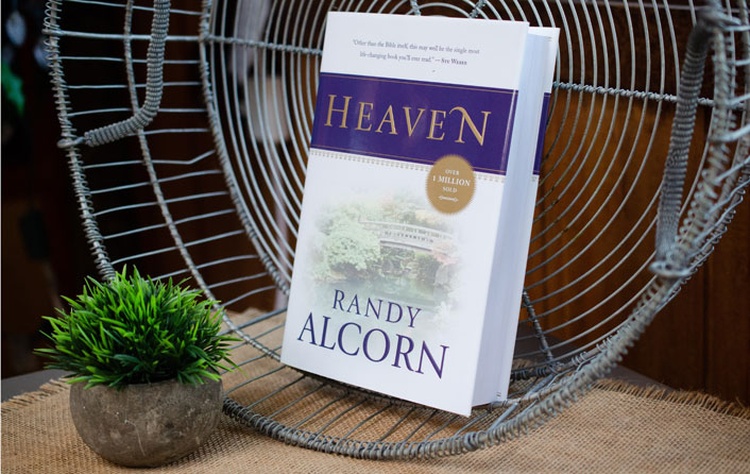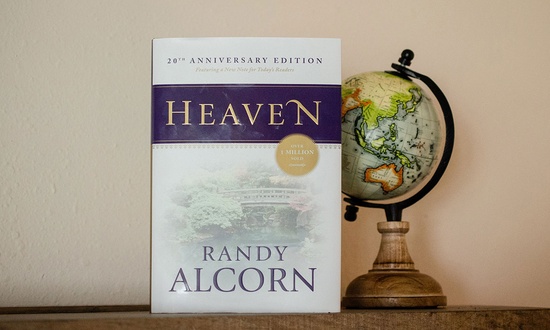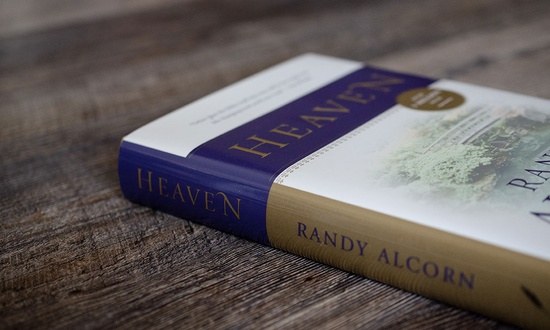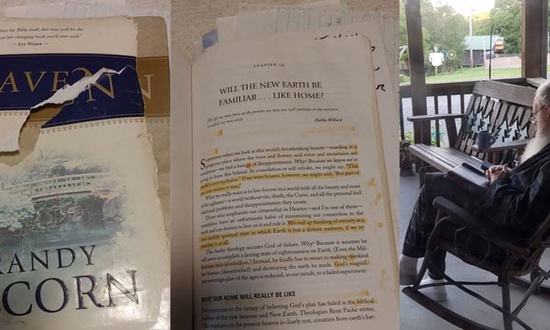I asked one of our EPM staff members to look through the one-star reviews on Amazon for my book Heaven and compile them for me. There are about 4,000 ratings and over 2,500 reviews of the book. Of the reviews, fortunately only 66 are one star (there are 1,760 five-star reviews, so I’m grateful!).
People are entitled to not like any book, of course, and I always welcome criticism of my books, and while they’re not fun, I usually manage not to take bad reviews personally. But in some cases, the reasons for giving Heaven the lowest possible rating were entertaining, and other times enlightening. (My writer friends talk about this a lot—and we often laugh about it, though for some it is admittedly frustrating, since reviewers tend to get the last word even when they misunderstand and misrepresent what an author actually said.)
So here is something I’ve never done—respond to reviews of my books. I hope it doesn’t sound defensive, or like I’m fishing for positive feedback. I get plenty of that, so don’t feel sorry for me! Please allow me this indulgence, and also understand that I am speaking on behalf of other authors who frequently see their books misrepresented in reviews. Let me also assure you that I am writing with a smile and a sense of humor, not a frown and a sense of feeling hurt.
Loved the book so they gave it one star, thinking that’s the highest rating (it’s actually the lowest):
- “A MUST READ for everyone."
- “Highly recommend this well researched investigation of what the Bible has to say about Heaven. ….Very uplifting, even life-changing.”
- “Great book for everyone to read.”
- “Loved it. I'm really excited about the new earth.”
- “I loved this book! It is the very best book I have ever read on Heaven! It lines up with the scriptures, which I looked up as I read the book. Heaven is presented in such an exciting and real way; I can hardly wait to get there! I rate this book 5 stars, but I can't seem to get it corrected.”
You should hear writers talk about this one: “People don’t want to buy a book with bad ratings, obviously. But some of my reviewers who sincerely love the book give it the lowest possible rating without understanding what they’re doing! Most people don’t read the reviews, they judge by the ratings. So some people will not read my book because those who love it accidently give it a terrible rating! They think, what could be better than #1, so I’ll give this book I love a one-star review!”
Had an issue with the seller, so gave it one star:
- “Did not get my order.”
- “Not received.”
- “I received the book, however, there was no DVD included in the back of the book. Very disappointed and will probably return the book!”
This is something writers talk about privately, often with laughter but sometimes with angst. “Because Amazon, God bless them, sends the wrong book, delays shipping two-weeks, or delivers it to the wrong house or in a rain-damaged package, they give my book a terrible rating. Could someone please explain that a book review or rating is ABOUT THE CONTENTS OF THE ACTUAL BOOK, not about the bookseller, the delivery process, whether the jacket is torn, or the snowstorm that delays delivery, or the delivery person who leaves it on the wrong doorstep.”
I should add that I often order through Amazon and while there is an occasional delivery problem, for the most part I find them remarkably efficient and dependable. I’m grateful for that, because if they weren’t my books would get a lot more bad reviews!
Thought the book was too religious:
- “Had I known better, I would not have bought this book. Full of evangelical ideologies, ignores any other goodness apart from Christianity. Now that I'm thoroughly depressed, I have to pay for Cognitive-Behaviorial therapy to heal from reading such depressing content.”
I must quote here a comment by Stephanie Anderson, my wonderful editor and EPM staff member. She didn’t intend for me to quote her, but I’m going to overrule her if she tries to edit it out: “This review is hands down my favorite. Heaven is depressing and you’re responsible for therapy!????”
- “My sister was so thrilled with this book. She encouraged me to read it. I have read many books on religions and I found this book very boring and in fact never finished it. It is a Born Again book and denies that Heaven is for anybody but those who are in the Christian religion. I can't believe this. The book quotes many passages from the bible to make it's [its] point, but I believe that you could make any point from the bible by selecting the quotes that suite [Sic] your need. This book was a waste of my money and I'm glad it wasn't expensive. And believe [me] I really tried to read it through.”
Can you imagine a book about Heaven that is not religious? Seriously, we’re talking about the afterlife! Living forever with God and God’s people in a place that’s better by far than the only place we’ve ever known? Doesn’t this intrinsically imply the supernatural, i.e. the religious? While books are not born again, people are. Jesus said, “I tell you the truth, unless you are born again, you cannot see the Kingdom of God” (John 3:3, NLT). Heaven is in fact for anyone and everyone who recognizes Jesus and believes in Him and submits their life to Him, the Jesus who said, “I am the way, the truth and the life, no one comes to the Father but by me” (John 14:6).
- “This is the height of Fundamentalist Christian dribble. Having said all of this, it is pretty entertaining. It includes such hilarious stuff as, (AND I AM NOT MAKING THIS UP) such probing questions: ‘Will heaven be boring?’, ‘Will there be sex in heaven?’ and my favorite ‘Will there be sports in heaven?’ If this guy ‘makes it to heaven’ leave me out. Such silliness!”
- “Not really sure the point of this book other than to ask some very irrelevant questions in regard to what heaven will be like. To me it does not matter what it will be like.”
Unlike some reviewers who are atheists or agnostics and don’t believe there is a God or Heaven, this person doesn’t seem to be questioning whether there is a Heaven. She just thinks it’s irrelevant and that it doesn’t matter. But if there is a Heaven, or even if there possibly is a Heaven, how could it not matter what it’s like? If you were moving to a new home, would it matter to you what it would be like? If you were going to live there forever, wouldn’t it matter all the more?
Commented and gave it one star, but apparently haven’t read the book:
- “As a Christian, it sounds like a book where the author just wrote something to make a living.”
This is another thing that writers comment on: that some reviewers take off on the comments of other reviewers, and judge the book by what the others say, not what the author said. Now the other reviewers’ criticisms certainly may be valid, but it would be great if each reviewer expressed their own opinion without leaning on what others say (especially when you haven’t read the book). You see this often when reviewers comment on other reviewers and reinforce their opinions even when they don’t deal with what the author actually said. I suppose it’s cheaper and faster to echo the comments of others than to actually buy and read the book.
Disagree with some aspects of my doctrine, so gave the book one star:
- “This is another one of those ‘born again’: books that does not even mention ‘PURGATORY’. I am sorry but you do not know Jesus if you don't believe in ‘the cleansing fires’ Another ‘proof’ book full of holes. Stay away!”
And finally, my personal favorite (and that of EPM’s Anna Wright, who compiled these gems, thanks Anna!). They gave it one star because I quote Lewis and Tolkien, the book mentions aliens, and I’m a fan of some sci-fi:
- “1). Refer page 446: ‘When we get excited reading Tolkien's The Lord of the Ring trilogy or Lewis's Chronicle of Narnia…’
First thing I don't understand why author used so many quotes from C.S. Lewis who was the author of ‘Narnia’. As you know ‘Narnia’ is all about white magic, or occult which is clearly condemned by God.
I did a quick google search about C.S. Lewis, he turned out to be a catholic just like his close friend JRR Tolkien. …so that's why.
2). Refer page 448: ‘whether God might inhabit new worlds with new creatures is not provable but certainly possible’
So Author believes in alien and is a sci-fiction fan.
From my understanding, Alien is a propaganda used by Satan and his fallen angels to deceive the world. When Christian is raptured in the second coming of Jesus. The world can't say this is Christian being raptured, instead they say they are being abducted by alien.
If the world says Jesus has taken his believers, then Jesus must be the truth then, Jesus is God. People will believe in Jesus thus saved. This is not Satan wants. Satan doesn't want you to believe in God, but fabricated a lie like ‘alien kidnapping’.
…So the whole time, Satan is planting these ideas
- there is not God, but alien (but we know we have God, Angel, Fallen Angel, and us Human, not mentioned of alien in bible)
- Alien abduction
- alien fabricated a prophecy about his returning thousand years earlier, but return to claim earth via his favorite channel Hollywood to churn out tv series like ‘Star Trek’
...So my question is why a reformed Christian Author wants to indulge in sci-fiction which is clearly motivated by Satan with a hidden agenda?”
I also did a search on Gene Roddenberry, it appears that he is freemason related.”
First, the reviewer is wrong in saying C. S. Lewis was a Catholic. He was Anglican, which means he was a Protestant. J. R. R. Tolkien was a Catholic, whose belief in Christ was a significant influence in Lewis becoming a Christian. There were some tensions between Tolkien and Lewis because Tolkien wanted him to become a Catholic.
Second, the Narnia books are emphatically not about the occult.
Third, though there is no biblical evidence that God has created beings on other planets, or that He ever will, there is likewise no clear statement to the contrary. I am not arguing that God will create other beings besides humans, animals, and angels to inhabit the future universe. I am only saying the infinitely creative God can do whatever He wishes, and is free to do so regardless of our opinions.
When people read reviews, they typically assume that the reviewer is accurately representing what the author actually says. (For instance, you might get the impression that I endorsed or even mentioned Gene Roddenberry, which I did not, though I have enjoyed some Star Trek.)
Here’s what I actually say in my condensed (with a long title) book Everything You Always Wanted to know About Heaven:
No Scripture passage proves that God will or will not create new races of intelligent beings, either on Earth or on other planets spread across the new universe. It’s not speculative, however, to say there will be a new celestial universe of stars and planets. Scripture is clear on this point; that’s what “new heavens” means. Whether God might inhabit them with new creatures is not provable but certainly possible.
Some people say, “To imagine that God would populate worlds with new beings is just science fiction.” We may have it backward. Science fiction is the result of mankind’s God-given sense of adventure, wonder, creativity, and imagination. It emerges from being made in God’s image. It’s not our sinfulness that arouses that excitement. It’s our God-given hunger for adventure, for new realms and new beings, for new beauties and new knowledge.
God has given us a longing for new worlds. Considering that his higher glory and praise come not from inanimate objects such as stars and planets but from intelligent beings such as people and angels, it’s no great stretch to suppose he might create other intelligent beings. It’s up to him, not us. But won’t it be fun to find out?




